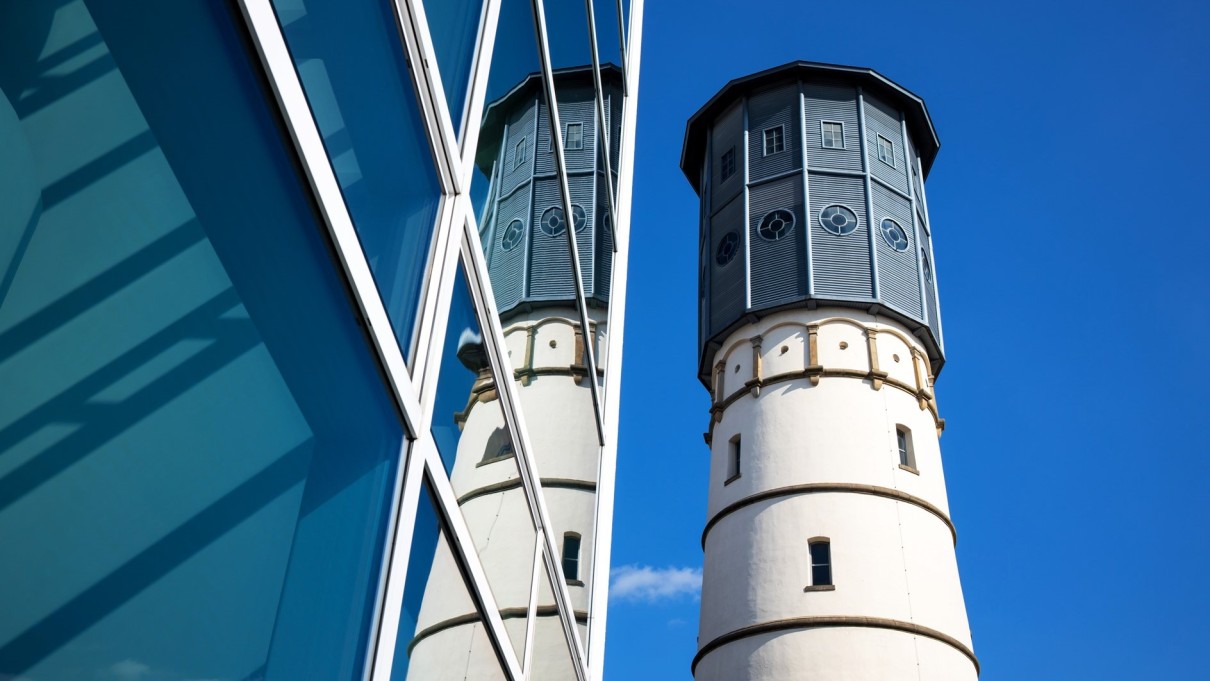Page content
Gütersloh on the way to becoming a smart city

Gütersloh attaches great importance to involving everyone in the smart city process. Photo: Gütersloh digital
In 2017, Gütersloh launched what is probably the city's largest citizen participation process - hundreds of citizens, political, business, scientific and administrative leaders came together and collected numerous ideas and approaches on how digitalisation can make life in the city easier and more sustainable. "This laid the foundation and the 'Smart Cities made in Germany' funding programme was the perfect way to implement the ideas," says Sandra Causemann, digital transformation officer at the city of Gütersloh. She and her team have joined forces in the "Gütersloh digital" initiative to tackle the transformation to a smart city together.
Funding for specific projects
The funding programme, which was supported by the Federal Ministry of the Interior and Home Affairs at the time, has provided Gütersloh with 8.5 million euros in funding since 2020. The city is investing the money in specific measures to become smarter and more sustainable:
- The city's young trees are being equipped with sensors to supply the trees with water as needed. Against the backdrop of climate change, they can thus be preserved and water resources used efficiently.
- Sensors are used to determine pedestrian frequency in the city centre. In this way, Gütersloh can derive insights for a sustainable, attractive and future-proof city centre. The issue of data protection plays a particularly important role here.
- Winter road maintenance in Gütersloh is also set to become smarter - with sensors that can alert people to frost formation and efficiently control the use of gritting materials.
- The centrepiece in Gütersloh is the "Smart City Ecosystem", the Urban Data Platform. Numerous data from sensors, IoT devices and social media are fed into the platform and help to make better decisions - for example to optimise traffic flows for the management of energy and water supplies or to improve safety in urban areas.
Gütersloh at the SCCON
Gütersloh digital will be demonstrating exactly how the smart city ecosystem works at SCCON from 15 to 17 October 2024: "The Smart Country Convention has been a must-attend event for us for years. We look forward to talking to other municipalities and institutions and learning about interesting solutions that we can take back to Gütersloh as ideas," says Causemann. "This year, we also have an active part and will be presenting our Smart City ecosystem at the stands of the Ministry of Homeland, Municipal Affairs, Building and Digitisation of the State of North Rhine-Westphalia and the Federal Ministry of Housing, Urban Development and Construction. Other municipalities should use our smart city ecosystem as clients and, ideally, develop further use cases with us as a development community."
Open source as the standard
Gütersloh decided early on to rely on open source tools for the development of smart city technologies. "On the one hand, we are complying with the requirements of the funding body and, on the other, we have already had very positive experiences with open source software ourselves. Some of the advantages we see are cost savings, a high level of customisability, the community concept, no dependence on providers and a high level of compatibility and interoperability."
Citizens in the smart city
Most people react very positively to smart city projects, says Causemann - they are curious about what is happening in the city. However, it is still a major challenge to get everyone on board, as many things in the Smart City are not immediately obvious. "That's why it's important for us to explain the benefits of our projects, preferably as concretely as possible."
For this reason, Gütersloh digital has also brought strong partners on board to help older people in particular with the transformation to a smart city. Together with the Gütersloh Adult Education Centre, for example, the Digital Trial City was launched. Senior citizens can playfully discover and try out digital topics and materials. This reduces fears and prejudices. And because learning is best done in a familiar and relaxed atmosphere - the Digital Trial City comes to the senior citizens' coffee or the meeting of the church circle. Once interest has been aroused and inhibitions have been overcome, there are various follow-up programmes to which so-called learning guides refer.
The concept, which Gütersloh digital developed together with the City of Gütersloh's senior citizens' officer, the adult education centre and the Hasso Plattner Institute, has proven its worth and Causemann recommends it to other cities on their way to becoming a smart city.
Tips on the road to the smart city
What are the most important insights you have gained in recent years, Mrs Causemann?
1. Only solutions that put people first are good solutions.
2. technology is only a tool and never the centre of attention.
3. it is particularly important to consider the follow-up costs from the outset.
Conclusion Smart City?
More than half of the funding period has now expired in Gütersloh - the funding programme ends in 2026 - will the transformation to Smart City Gütersloh also end then? Sandra Causemann says no: "Designing a smart city is an ongoing task. On the one hand, it involves changing people's attitudes, which takes some time. Secondly, it's about innovation; a smart city is constantly evolving. That's why I believe that this project will never be completely finished."
Gütersloh digital will be presenting the current state of development, specific projects, obstacles and best practices at the Smart Country Convention in Berlin from 15 to 17 October 2024.
Save your free ticket now!
Join us for three days of key highlights on the digital transformation of public administration, Smart Cities, and Smart Regions – featuring exciting keynotes, inspiring panels and plenty of networking opportunities. Discover how to successfully navigate the opportunities and challenges of digitalization.



